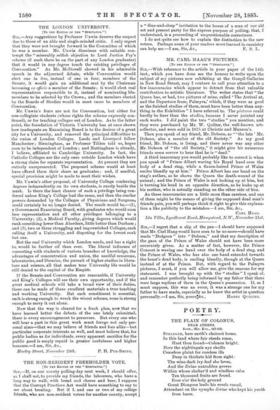THE LONDON UNIVERSITY.
[To THE EDITOR OP THE " SPECTICTOR.'1 SIR,—Any suggestions by Professor Unwin deserve the respect due to those of an able and single-minded critic. I only regret that they were not brought forward in the Committee of which he was a member. Mr. Unwin dismisses with suitable con- tempt the " miserably selfish objection to Lord Justice Fry's scheme (if such there be on the part of any London graduates) that it would in any degree touch the existing privileges of Convocation." As Mr. McDowell showed in his admirable speech in the adjourned debate, while Convocation would elect one in five, instead of one in four, members of the Senate, it would gain an additional seat by the Chairman becoming ex officio a member of the Senate ; it would elect real representatives responsible to it, instead of nominating life- members to be selected by the Crown ; and the members elected by the Boards of Studies would in most cases be members of Convocation.
Mr. Unwin's fears are not for Convocation, but either for non-collegiate students (whose rights the scheme expressly con- firmed), or for teaching colleges out of London. As to the latter point, the foundation of Victoria University has at once shown how inadequate an Examining Board is to the desires of a great city for a University, and removed the principal difficulties to the union of London Colleges. Leeds and Liverpool follow Manchester ; Birmingham, as Professor Tilden told us, hopes soon to be independent of London ; and Nottingham is already, I believe, affiliated to Cambridge University. In fact, the Catholic Colleges are the only ones outside London which have a strong claim for separate representation. At present they are entirely unrepresented. The proposed scheme would at least have offered them their share as graduates ; and, if needful, special provision might be made to meet their wishes.
Mr. Unwin's other proposal, of University College conferring degrees independently on its own students, is surely beside the mark. Is there the least chance of such a privilege being con- ferred unless King's College had the same, and then the similar powers demanded by the Colleges of Physicians and Surgeons could certainly be no longer denied. The result would be,—(1), a Government Examining Board, with graduates who would soon lose representation and all other privileges belonging to a University; (2), a Medical Faculty, giving degrees which would rank something lower than Aberdeen, little better than Durham ; and (3), two or three struggling and impoverished Colleges, each calling itself a University, and disputing for the lowest rank but one.
But the real University which London needs, and has a right to, would be further off than ever. The liberal influence of consorting with students of various branches of knowledge, the advantages of concentration and union, the needful museums, laboratories, and libraries, the pursuit of higher studies in litera- ture and science, all that makes true University life would be still denied to the capital of the Empife.
If the Senate and Convocation are reasonable, if University and King's Colleges will see their own opportunity, and if the great medical schools will take a broad view of their duties, there can be made of these excellent materials a true teaching and working University. But each constituent is essential, each is strong enough to wreck the wisest scheme, none is strong enough to carry it out alone.
Now that the way is cleared for a fresh plan, now that we have learned better the defects of the one lately submitted, there is every encouragement to persevere. Bat every one who will bear a part in this great work must forego not only per- sonal aims—that we may believe of friends and foes alike—but particular corporate interests as well, and must believe that, for public bodies as for individuals, every apparent sacrifice for the public good is amply repaid in greater usefulness and higher honours.—I am, Sir, &c., Harley Street, November 24th. P. H. PYE-SMITH.


































 Previous page
Previous page